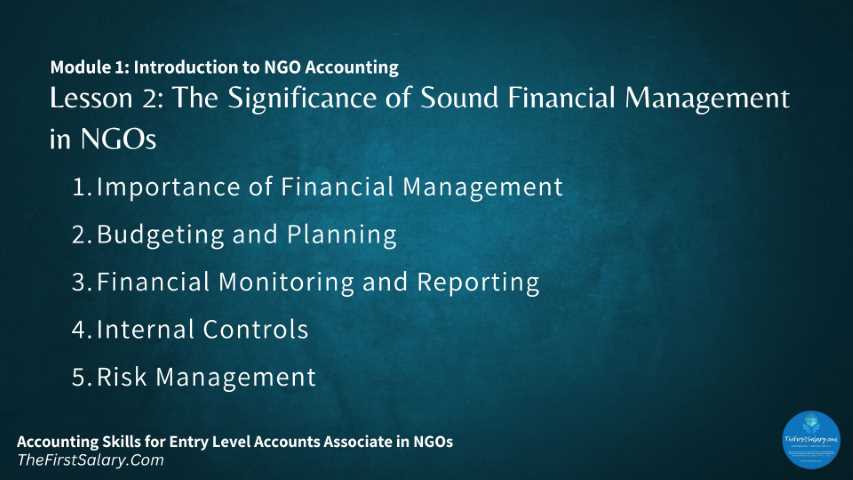
Module 1: Introduction to NGO Accounting
Lesson 2: The Significance of Sound Financial Management in NGOs
Effective financial management is vital for the success and sustainability of NGOs. This lesson will explore why sound financial management is essential, how it impacts the organization, and the strategies to ensure financial stability. By the end, you’ll understand the critical role of financial management in enhancing an NGO’s operations.
Key Concepts:
• Importance of Financial Management
• Budgeting and Planning
• Financial Monitoring and Reporting
• Internal Controls
• Risk Management
1. Importance of Financial Management:
» Ensures Sustainability:
Proper financial management helps NGOs maintain financial stability and sustainability, ensuring they can continue their operations and fulfill their missions.
» Builds Trust:
Transparent financial practices build trust with donors, stakeholders, and beneficiaries, enhancing the organization’s credibility and support.
» Optimizes Resource Use:
Effective management ensures that resources are used efficiently and effectively, maximizing the impact of every dollar spent.
2. Budgeting and Planning:
» Creating Budgets:
Budgets provide a financial plan for managing resources and expenses. They help in allocating funds to various programs and activities, ensuring that financial resources are used according to the organization’s priorities.
» Financial Forecasting:
Forecasting involves predicting future financial conditions based on current data. It helps in planning for potential financial challenges and opportunities.
» Annual Planning:
Annual financial planning involves setting financial goals for the year and preparing a budget that aligns with these goals. It includes estimating income, planning expenditures, and setting financial targets.
3. Financial Monitoring and Reporting:
» Regular Monitoring:
Ongoing monitoring of financial transactions ensures that spending aligns with the budget and identifies any discrepancies early. Regular checks help in maintaining financial control and accountability.
» Reporting:
Financial reports provide a snapshot of the NGO’s financial health. These reports include income statements, balance sheets, and cash flow statements, which help in assessing the financial performance and making informed decisions.
» Compliance Reporting:
NGOs must comply with regulatory requirements, which involves preparing and submitting financial reports to regulatory bodies. Compliance reporting ensures that the organization adheres to legal and financial standards.
4. Internal Controls:
» Implementing Controls:
Internal controls are procedures designed to safeguard assets, ensure accurate financial reporting, and prevent fraud. Implementing strong internal controls helps in maintaining financial integrity.
» Segregation of Duties:
Dividing responsibilities among different staff members helps prevent fraud and errors. Each person handles a specific part of the financial process, reducing the risk of misuse.
» Regular Audits:
Conducting regular audits ensures that financial records are accurate and that internal controls are effective. Audits help in identifying areas for improvement and ensuring compliance with financial policies.
5. Risk Management:
» Identifying Risks:
Identifying potential financial risks, such as cash flow issues or funding shortfalls, helps in developing strategies to mitigate these risks.
» Developing Strategies:
Creating strategies to manage identified risks includes setting up contingency plans, securing additional funding sources, and improving financial practices.
» Monitoring Risks:
Regularly monitoring financial risks ensures that emerging issues are addressed promptly, helping to maintain financial stability.
» Practical Application:
Steps for Effective Budgeting:
1 Develop a detailed budget plan based on organizational goals.
2 Allocate funds to various programs and monitor spending.
3 Adjust the budget as needed based on actual financial performance.
» Practical Exercise:
Create a budget for a new project. Allocate funds, forecast expenses, and prepare a financial report based on the project’s needs and goals.
» Example:
An NGO improved its financial management by implementing a detailed budget, regular monitoring, and strong internal controls. This led to better resource allocation, enhanced donor confidence, and successful project outcomes.
Questions:
1 What is the role of budgeting in financial management?
2 How do internal controls contribute to financial integrity?
» Common Mistakes:
• Neglecting Budget Planning: Failing to create and follow a detailed budget can lead to overspending and financial instability.
• Ignoring Financial Reports: Not reviewing financial reports regularly can result in missing discrepancies and failing to address financial issues.
• Weak Internal Controls: Inadequate internal controls increase the risk of fraud and financial mismanagement.
» Summary:
This lesson highlighted the importance of sound financial management in NGOs, including budgeting, financial monitoring, internal controls, and risk management. Effective financial practices are crucial for sustaining and growing an NGO’s impact.
» Takeaways:
• Financial management ensures sustainability and builds trust.
• Regular budgeting and monitoring are essential.
• Strong internal controls and risk management are key.
FAQs:
Why is financial management important for NGOs?
It ensures sustainability, builds trust, and optimizes resource use.
What is budgeting?
Budgeting involves planning and allocating financial resources for various activities and programs.
How can internal controls prevent fraud?
By implementing procedures to safeguard assets and ensure accurate reporting.
What is financial forecasting?
Predicting future financial conditions based on current data to plan for challenges and opportunities.
Why are regular audits important?
They ensure financial records are accurate and internal controls are effective.
